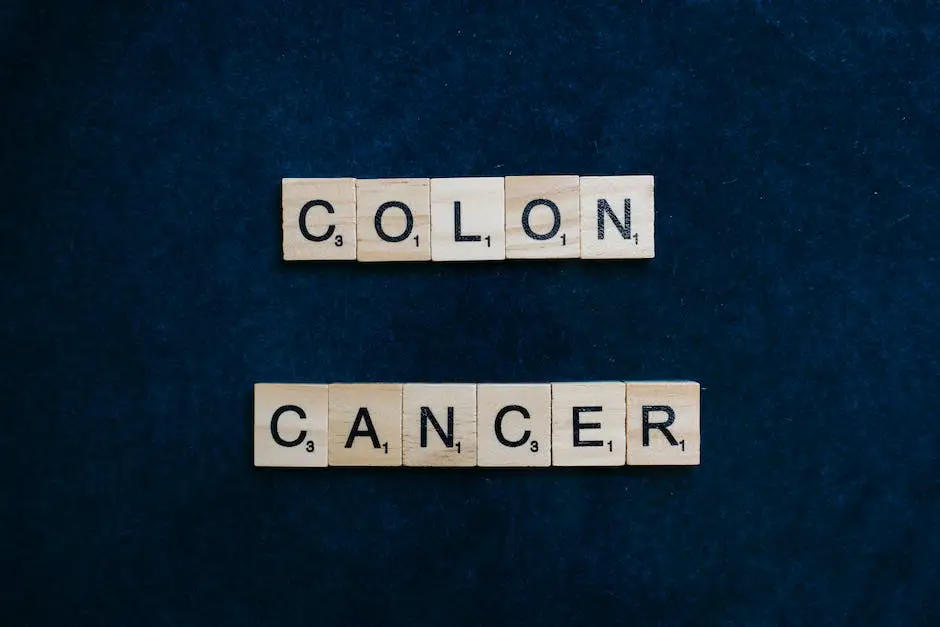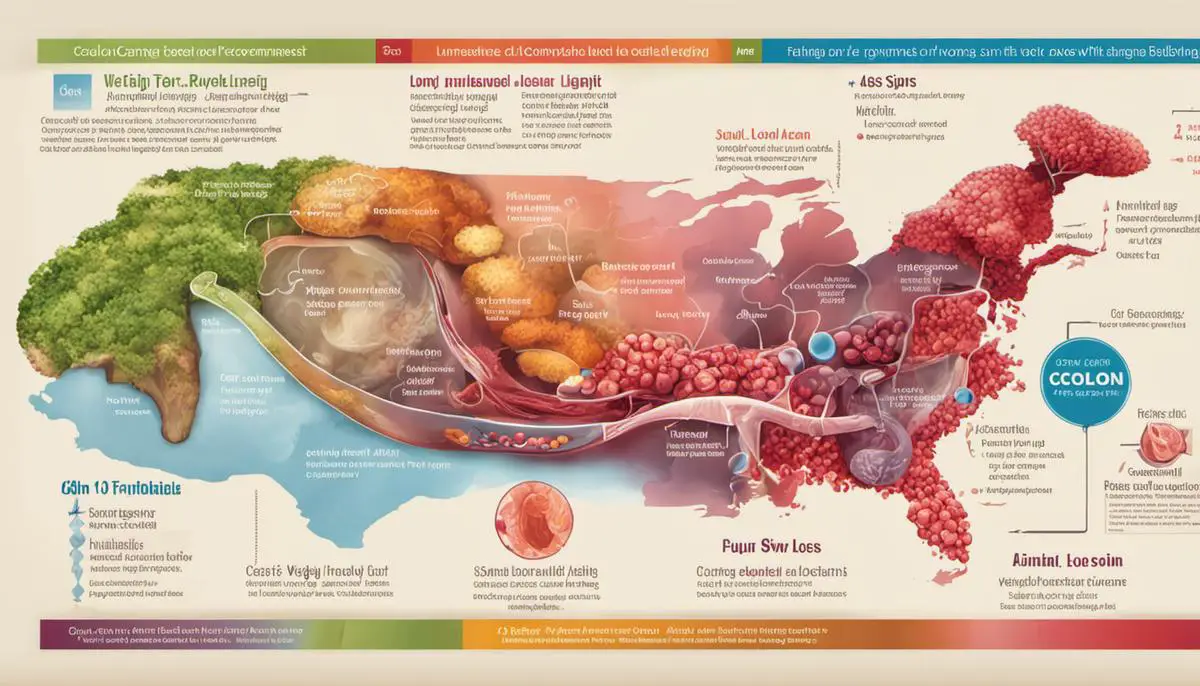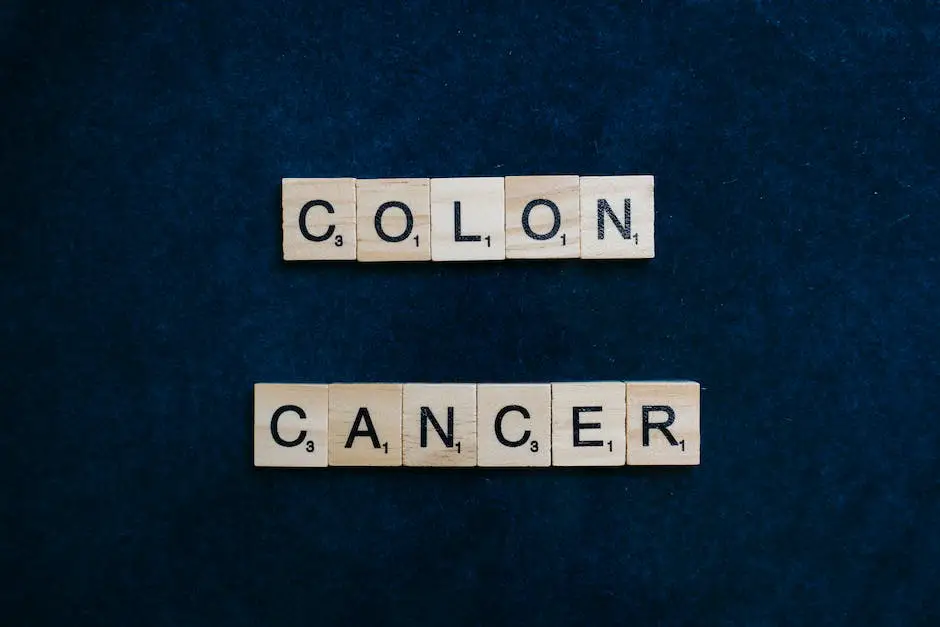Colon cancer, a disease that traditionally affects individuals over 50, is now witnessing a concerning shift in demographics, with a growing incidence amongst younger populations. This shift compounds the importance of comprehending this malignancy, not just its anatomy and progression, but also the risk factors and early warning signs that could herald its onset. As one of the leading causes of cancer deaths in the United States, colon cancer calls for awareness and proactive stance towards its detection.
Understanding Colon Cancer
Understanding Colon Cancer: Basic Information
The colon, also known as the large intestine, is a crucial part of the digestive system. Its main function is to absorb water and electrolytes from digested foods, while also serving as a site for the bacterial fermentation of undigested materials. When cells in the colon start to grow out of control, colon cancer can develop. This uncontrolled growth leads to tumors, which may be either benign (non-cancerous) or malignant (cancerous). Colon cancer specifically refers to malignant growths.
According to the American Cancer Society, about 1 in 23 men and 1 in 25 women will develop colon cancer in their lifetime. This disease is the third most common non-skin cancer and the second leading cause of cancer deaths in the United States. The risks increase for those over 50, individuals with a personal or family history of colon cancer or polyps, and people with diseases like ulcerative colitis or Crohn’s Disease.
Stats also reveal that colon cancer has a lower incidence among Asian/Pacific Islanders and Hispanic/Latino populations, but is more common in African Americans than in any other group. It’s important to mention that anyone can get colon cancer, though, and it can affect both men and women.
Early Signs of Colon Cancer
It’s crucial to catch colon cancer early, when it’s most likely to be treatable. This begins with understanding the early signs, which often include changes in bowel habits such as diarrhea or constipation lasting more than a few days, a feeling that the bowel doesn’t empty completely, blood (either bright red or very dark) in the stool, and persistent cramping or belly pain. Other early signs of colon cancer include fatigue, unexplained weight loss and weakness.
It’s also worth noting that symptoms can vary based on the tumor’s size and location in the large intestine. At times, colon cancer might not present any symptoms, which further emphasizes the importance of regular screenings especially for those with increased risk.
Early detection is key for successfully treating colon cancer. Routine screenings such as fecal occult blood tests (FOBT), fecal immunochemical tests (FIT), sigmoidoscopies, and colonoscopies are recommended, especially for individuals over 45 or 50. Aside from regular screenings, maintaining a healthy lifestyle with a balanced diet, regular exercise, and limiting alcohol and tobacco use can play a significant role in preventing colon cancer.
Final Thoughts
Getting to grips with the early signs and risk factors of colon cancer, paired with regular screening, is essential for a preventative and proactive approach to dealing with this disease.

Risk Factors for Colon Cancer
Understanding Colon Cancer Risk Factors
Several factors can contribute to the likelihood of developing colon cancer, with age being one of the most significant. Studies have found that around 90% of individuals who receive a colon cancer diagnosis are older than 50. Regular screenings become extremely important for individuals in this age range in order to spot any potential signs early on.
Genetics also factor into colon cancer risk. You are two to three times more likely to develop this type of cancer if you have a close family member, such as a parent, sibling, or child, who also had it. Alongside this, specific genetic syndromes that can be passed down through families may increase the risk further.
Your lifestyle choices, including diet and exercise habits, can influence the risk of colon cancer. Consumption of high-fat foods, particularly those from animal sources, and a lack of dietary fiber may increase your risk. A sedentary lifestyle, coupled with physical inactivity that can lead to obesity, can also up the danger. It’s advisable to maintain regular physical activity to help lower your risk.
In connection with lifestyle, obesity is a considerable risk factor for colon cancer. Those overweight have an elevated risk of developing, and dying from, colon cancer.
Excessive alcohol intake, or, more precisely, more than 2 drinks a day for men and 1 for women, can also raise the risk of colon cancer. The recommendation is to moderate consumption or better yet, abstain entirely.
Furthermore, smoking significantly increases the risk of many types of cancer, including colon cancer. Smokers have an increased likelihood of fatality from the disease than non-smokers. The takeaway message here is that it’s never too late to quit, and the benefits start immediately.
By incorporating regular screenings, a balanced diet, physical activity, moderation in alcohol consumption, and quitting smoking, you can potentially decrease your colon cancer risk. Being aware of these risk factors can help you gauge your likelihood and take preventable measures early.

Early Signs and Symptoms
Spotting Early Signs and Symptoms of Colon Cancer
Early detection and treatment of colon cancer significantly ramps up the odds of a successful outcome. Therefore, it’s crucial to be aware of the early signs and symptoms. These include inconsistencies in bowel habits, discomfort in the abdomen or cramps, and rectal bleeding.
Colon cancer can cause changes in bowel movements, such as persistent diarrhea or constipation, or a change in stool consistency. These changes are typically persistent, lasting several weeks, and are different from occasional irregularities in bowel habits. Another symptom to look out for is a feeling of incomplete emptying after a bowel movement.
Another potential early sign is abdominal discomfort. This can manifest as cramps, gassiness, or unexplained pain. While it’s true that these symptoms can often be connected to less serious conditions, it’s vital to seek medical attention if the discomfort persists.
Bleeding from the rectum or having blood in your stool is an urgent symptom of colon cancer. Bright red blood or darker clots could indicate bleeding in the lower intestine or rectum. Additionally, black, tarry stools can signify bleeding in the upper part of the digestive system.
Recognizing Early Signs of Colon Cancer
Beyond the commonly known physical indicators, there exist subtle signs that may hint at the presence of colon cancer. Persistent fatigue or weakness can be a major red flag, often resulting from the anemia brought on by slow, chronic blood loss within the intestines. Notably, this form of fatigue doesn’t typically improve with rest, and it may even cause shortness of breath.
Another symptom to remain vigilant about is unexplained weight loss, particularly if it’s paired with a reduced appetite. This symptom, while indicative of several different types of cancer, is pertinent to colon cancer because malignant cells tend to consume a large portion of the body’s energy supply. The immune system’s response to combat the disease can further exacerbate the weight loss.
Though these indicators can be pointed towards less serious conditions, any persistence or causes for concern should prompt a medical consultation. Early detection is crucial when dealing with cancer or any serious ailment, as it significantly improves the odds of successful treatment.

Screening and Diagnosis
Detecting Colon Cancer Early: Methods for Screening and Diagnosis
In the battle against colon cancer, screening is an incredibly valuable tool. It allows for early detection and thus swift intervention. Several screening methods exist, each offering its own unique set of advantages and drawbacks.
Colonoscopy
Among all the screening techniques available, a colonoscopy is widely recognized as the most reliable. This test involves a doctor or skilled technician examining the entire colon and rectum using a thin, flexible instrument called a colonoscope. Patients are mildly sedated during the procedure for comfort. If abnormal growths known as polyps are discovered, they can be removed immediately during the test and sent for biopsy to check for cancerous cells. It’s recommended for individuals at average risk to undergo colonoscopy every 10 years starting from the age of 50. However, those with a family history of the disease or other high-risk factors should commence screening at an earlier age.
Stool Tests
Stool tests, including the fecal occult blood test (FOBT) and the fecal immunochemical test (FIT), can be effective tools for early detection of colon cancer. Both these tests detect microscopic amounts of blood in the stool, which can be indicative of colon cancer. While not as comprehensive as a colonoscopy, they can still serve as an initial step in the screening process when colonoscopy is not immediately available or feasible. These tests are typically done annually.
A more advanced type of stool test, the multi-target stool DNA test (MT-sDNA), checks for certain DNA or genetic changes associated with colon cancer, along with testing for blood. This test is done every three years.
Imaging Tests
Imaging tests like CT colonography (also known as virtual colonoscopy) use advanced CT scanning to produce detailed images of the colon and rectum. This test can be a good alternative for people who cannot undergo a traditional colonoscopy for medical reasons. In this procedure, air is pumped into the colon via a small tube inserted into the rectum, then images are taken from outside the body.
Given the evolution of screening procedures, early detection of colon cancer is more possible than ever. However, it’s important to remember that these tests vary in their sensitivity, accuracy, and preparation requirements. The choice of the most suitable test depends on various factors including age, personal and family medical history, and individual health status.
In interpreting these screening results, it is important for individuals to consult with their healthcare provider to discuss any potential risks or benefits. In the case of abnormal results, subsequent diagnostic tests may be required to confirm the presence of colon cancer, such as a biopsy during a follow-up colonoscopy.
Understanding the early detection of colon cancer is a crucial step towards effective treatment and higher survival rates. This is particularly important for individuals who are at risk. By prioritizing regular checkups and staying vigilant about changes in your body, the chances of early detection and successful treatment for colon cancer can be greatly improved.

Importance of Early Detection
The Significance of Early Detection: Your Strongest Defense Against Colon Cancer
Colon cancer, also referred to as colorectal cancer, ranks among the most prevalent forms of cancer in the United States. Aware of this, it remains one of the most preventable when caught in its early stages. The power of early detection cannot be emphasized enough – it greatly boosts the prospects of survival and can often lead to a complete cure. Remarkably high survival rates have been associated with the early detection of colon cancer.
The Benefits of Early Detection
When colon cancer is detected in its early stages, treatment can frequently result in a complete cure. This is because in the early phases, cancer cells are localized to the polyps within the colon. Removing these polyps can prevent cancer from spreading to other parts of the body, effectively eradicating the disease.
In more advanced stages, colon cancer can spread beyond the colon and rectum, greatly reducing the probability of full recovery. However, early detection can stop this progression. The survival rate for localized stage colon cancer is 90%, but it drops to about 14% for advanced stages where the cancer has spread to other parts of the body.
Signs of Colon Cancer: What to Look For
Recognizing the early signs of colon cancer can lead to timely detection and treatment. Signs may include changes in bowel habits such as diarrhea, constipation, or a change in the consistency of your stool that lasts longer than four weeks. Additional symptoms may include abdominal discomfort, such as cramps, gas or pain, rectal bleeding, persistent weakness or fatigue, unexplained weight loss, or the feeling that your bowel isn’t emptying completely. All these symptoms warrant a discussion with your doctor, especially if they persist.
The Importance of Regular Screening
The American Cancer Society recommends regular screenings starting at age 45 for individuals with average risk for colon cancer. This is because colon cancer doesn’t always show symptoms in the early stages, making routine screenings essential in catching any potential issues as early as possible. Screenings can also detect precancerous polyps, abnormal growths in the colon or rectum that can lead to colon cancer, which can be removed before they turn malignant.
Screenings may include colonoscopies, stool-based tests, a sigmoidoscopy, or a CT colonography, also known as a virtual colonoscopy. The best screening test is the one that gets done, so consult with your healthcare provider on what is most suitable for your age, health, and personal risk factors.
In summary
Prioritizing your health through routine checks and screenings can significantly reduce your risk of colon cancer, and most importantly, catch it in its earliest and most treatable stage. The power of prevention and early detection should not be underestimated in the fight against colon cancer.

Each of us bears the responsibility to safeguard our own health and this begins with awareness. Understanding the risk factors involved in diseases such as colon cancer can lead to more conscientious lifestyle choices. Recognizing early warning signs is equally vital as it empowers prompt action and intervention. Above all, the pivotal role of regular screenings in ensuring early detection and improving survival rates cannot be overstated. Colon cancer may be a formidable adversary, but armed with the right knowledge, timely screening and proactive healthcare, it is an adversary that can be vanquished.
